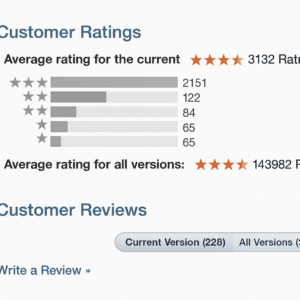 Have you noticed the proliferation of consumer review sites in the last few years? It’s not just Yelp (restaurants, etc.), TripAdvisor (hotels, etc.), and Angie’s List (contractors, doctors, etc.). It’s also Amazon (everything they sell), iTunes (albums, podcasts, Apps, etc.), RottenTomatoes (movies) and countless other sites.
Have you noticed the proliferation of consumer review sites in the last few years? It’s not just Yelp (restaurants, etc.), TripAdvisor (hotels, etc.), and Angie’s List (contractors, doctors, etc.). It’s also Amazon (everything they sell), iTunes (albums, podcasts, Apps, etc.), RottenTomatoes (movies) and countless other sites.
It used to be that in business we controlled our message, our image, our brand… because we were the ones investing in PR, marketing, and advertising. These days, it’s no longer about what we say; it’s about what they say.
It used to be about your “brand”. Now it’s about your “reputation”. Consumers, customers, and employees have a newfound voice, a profound new power.
The problem is that when we humans are unhappy, we purportedly tell three times more people than when we’re happy. And now we’ve got megaphones to do it.
Combine this with another fact – that we find what our peers say about your business to be six times more convincing than what you say – and your odds seem to be worse than at Rick’s Casino in Casablanca. What’s a business to do?
I have two suggestions:
- Accept that information in flowing freely. As such, our organizations have to be better that in the past: More tuned in, more customer-focused, more responsive to complaints and, perhaps, gentler on employees being “right-sized”. Social media helps great business prosper faster, and helps poor businesses fail sooner.
- Next, assuming that your business is doing everything right, why not facilitate the positive?
Here’s an example: Recently, I dined at a delightful “crab shack” in Charleston, South Carolina. After complimenting my server and adding a great tip (the monetary kind), she handed me a card. This card was not in general circulation at the restaurant. Rather, she was trained to present this card to people who appeared to be thrilled with their meals. Curious about what the card said?
“Please allow others to know about your wonderful dining experience by posting on Yelp, Fodors, 10Best, TripAdvisor, or Yahoo’s TravelGuide. Thank you.”
There was no proposed reward. That would have made it feel like… well, I can’t use the word I’m thinking of in print. An incentive wasn’t required. When someone does something nice for us (such as providing an excellent meal, attentively delivered), we are wired to want to reciprocate.
Think about how you use this simple idea to drive more positive conversation about your business. Perhaps it’s by soliciting your happy customers to talk about what they’ve been able to achieve by using your products and services (ideally in a video – very believable). Remember, “marketing” is not about you; it’s about them – even more so in a “world of mouth”.
Or maybe, it’s by enabling reviews (and not just the positive ones) on your website.
Here’s another real-world example with a counterintuitive twist: After Hollywood Videos went bust in my neighborhood in 2010 (not long after the demise of Blockbuster; but before the emergence of RedBox) my kids started agitating for NetFlix.
I knew exactly where that was going – getting DVDs by mail and then losing them – and issued a definitive “no way, Jose.” “But wait Dad, they can now stream over the internet directly to our Wii and X-Box 360.” And so we signed up.
Netflix streaming was oh-so-cool and within hours I wanted it on my 110” projection TV (AKA home theater), unfortunately 2 ½ floors away from my WiFi router. No worries: Googling “Netflix streaming WiFi HDMI” found me a link to RoKu (RoKu is still the #1 search result two years later – the amazing power of Keywords, but that’s a story for another article). What an valuable little device for around $100. For the record, I’ve recently replaced it with Apple TV2, but that’s yet another story.
Now, get this: On RoKu’s product page, where they were trying to close the deal, they presented more than 1,000 negative reviews of their product, organized in a way that was convincingly authentic (which is critical).
Normally, I would have gone next to CNET Reviews, Consumer Reports, and other independent review sites and found who knows what, but at Roku.com, the whole picture was right there. After reading perhaps 30 negative reviews, do you know what I did? I clicked “buy”, because I felt that I understood exactly what this product could do and not do. Upon receipt, I was not disappointed.
When a customer “gets it”, the likelihood of product return is actually 45% lower (according to one study by Internet e-tailer Petco.com). What’s the value of that… in lower product return costs, in reduced customer dissatisfaction, and the like? I believe that’s actually priceless in a world of mouth.
So make your business better! Figure out how to facilitate, promote, and highlight the authentic voice of your customers to your benefit… and to theirs. And then develop a plan to make it happen… and then execute your plan!

Author’s addendum: In response to an email question yesterday about soliciting Yelp reviews with a giveaway, I answered:
“In my opinion, the best way to succeed on Yelp is by providing outstanding customer service and by building out a comprehensive business listing using biz.yelp.com’s free tools. Further, you might put a “Find us on Yelp” button on your website and/or on your front door, business cards, etc.
The reason I believe your contest won’t work relates to the nature of Yelp itself. The vast majority of your customers have never written a Yelp review. Even if you convince them to do so (and most won’t), they’ll then each have a grand total of one review – yours. Such reviews, if not automatically filtered out, are at best, highly suspicious and not credible.
When I look at Yelp (and I often do to find great restaurants – including as recently as last week in Torrance, CA – I found a great sushi place) I always look at how many reviews someone has written before reading their comments (ignoring anyone one who’s written fewer than 5 reviews).
So, provide great service and remind people to “Find you on Yelp”. Human psychology will cause the rare elite-Yelper happy-customer to want to reciprocate with a credible review. That’s more valuable than 100 single-contribution reviews.”